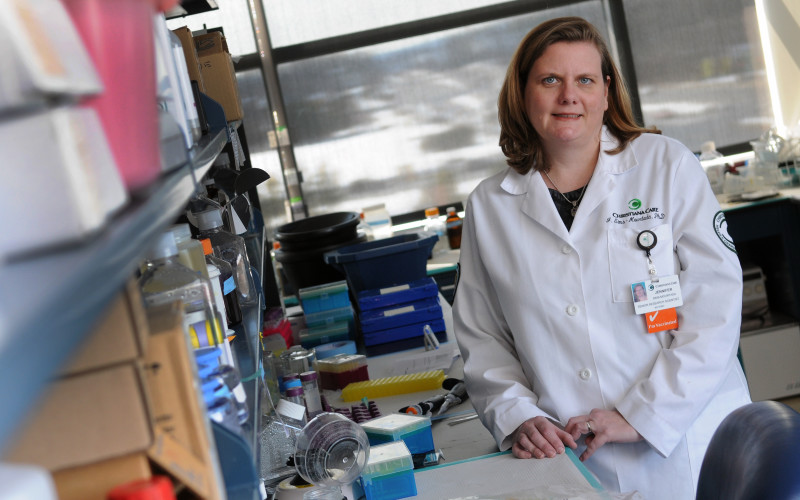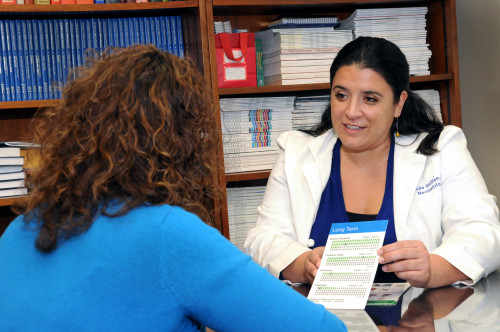New grants fund clinical and translational research at Christiana Care

Delaware CTR-ACCEL has awarded pilot grants to two Christiana Care Health System researchers to further their studies in advancing patient care through a federally funded, multi-site grant program supporting clinical and translational research. Ursula Guillen, M.D., of Christiana Care Neonatal Associates, received $84,000 and Senior Clinical Scientist Jennifer Sims-Mourtada, Ph.D., of the Helen F. Graham Cancer Center & Research Institute, received $89,000.
With her grant, Dr. Sims-Mourtada will further her research into new treatment options for patients with triple negative breast cancer. Her mentor is Daniel C. Flynn, Ph.D., of the University of Delaware.
Triple negative breast cancer does not express genes for the three groups of proteins typically found in breast cancer and may therefore be resistant to therapies that target those proteins. Dr. Sims-Mourtada has focused more than 10 years of research on the Hedgehog molecular signaling pathway, which transmits cellular information that promotes proliferation of breast cancer stem-like cells.
“Our belief is that chemotherapies can trigger the Hedgehog pathway and essentially result in the repair of the cells attacked by chemotherapy and, of course, continued viability of the cancerous cells,” Dr. Sims-Mourtada said. “This very exciting grant will enable us to continue to our next step, where we will pursue extensive data regarding whether the Hedgehog pathway activation does lead to proliferation of breast cancer stem-like cells and how that process occurs and could be prevented. That data is vital to our pursuit of additional funding from the National Institutes of Health, which could lead to new treatments.”

Dr. Guillen will conduct a six-hospital study on an original decision-making tool intended to help doctors counsel parents facing an extremely premature childbirth. With David A. Paul, M.D., interim chair of pediatrics at Christiana Care, Dr. Guillen is conducting a randomized control trial of informational cards she and her research team created after more than five years of research and input from clinicians and parents of extremely premature babies. The study will compare the effectiveness of consultations using the standardized decision tool to that of traditional consultations.
“Parents facing such critical decisions need to be empowered to make fully informed decisions that reflect their values as well as all the pertinent information medical professionals have to offer,” Dr. Guillen said. “Through our illustrated, concise series of cards, we hope to help doctors assist parents in reducing what we call ‘decisional conflict,’ that state of uncertainty about the course of action to take when making choices involving risk or uncertainty of outcomes.”
These projects are “excellent examples of what the ACCEL program was intended to do — help transition extensive and groundbreaking research into practical clinical applications,” said William S. Weintraub, M.D., the John H. Ammon Chair of Cardiology and director of the Center for Outcomes Research at the Value Institute, who serves on ACCEL’s executive committee and as the Christiana Care primary investigator.
At an event marking the launch of ACCEL at the University of Delaware in February, Dr. Weintraub said that Delaware — a demographic microcosm of the country — is the best state in the nation for studying population health.
“That’s why community engagement is such an important part of this program,” he added. “This is the best collaboration I can think of for a grant aimed at building the infrastructure for population health.”
Toward this goal, Michael Rosenthal, M.D., chair of Family & Community Medicine, is overseeing the community engagement segment of the grant, developing a research agenda with a community advisory council.
Brian M. Rahmer, Ph.D. (cand.), MS, CHES, manager of health services research in Family and Community Medicine and a research scholar in the Value Institute, is the community research specialist for ACCEL’s community engagement and outreach. With co-investigators at Nemours and the University of Delaware, he is using ACCEL pilot grant support for community-based participatory research with youth and community service providers in Wilmington. The goal is to better understand assets, barriers and social connections around health promotion and obesity prevention.
“This kind of research readily invites a different type of expert to the table,” Rahmer said. “These young people and the community members who work with and for them can provide a context within which we might refine new research questions and begin to shape more meaningful solutions in the way we think about improving the health of individuals, communities and populations. This is the essence of translational research.”
Leadership in ACCEL
Christiana Care is ACCEL’s center for epidemiology, study design, biostatistics and community engagement in a research partnership with the University of Delaware, Nemours/A.I. duPont Hospital for Children (Nemours), and the Medical University of South Carolina. Funding from a five-year, $20 million grant from the National Institutes of Health as well as $5 million from the State of Delaware and $3.3 million from Christiana Care and the three other institutions support the program.
ACCEL’s priorities are cancer, cardiovascular disease, obesity and infant mortality with funding for:
- Pilot grants that will allow new investigators to test and develop promising ideas.
- Support in design and analysis of clinical and translational research projects.
- Mentoring for junior scientists and clinicians.
- Recruitment and hiring of talented new investigators at all four institutions.
- Community engagement to address healthcare challenges facing the citizens of Delaware.